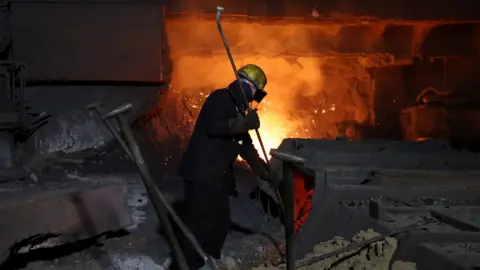### Government Action Secures Raw Materials for Scunthorpe Steel Plant
In a recent development concerning the British Steel plant located in Scunthorpe, the government has successfully ensured the provisioning of essential raw materials required for the plant’s operations in the near future. As outlined by officials, the necessary resources have been secured to maintain production, allowing local steel workers and their families to find renewed confidence and assurance amid previous uncertainties regarding job security.
One notable action taken by the government includes the arrival of 55,000 tonnes of blast furnace coke from Australia at the port of Immingham, which occurred over the weekend. This shipment is set to be transferred by rail to the Scunthorpe facility. Additionally, the arrival of over 66,000 tonnes of iron ore pellets, along with 27,000 tonnes of iron ore fines sourced from Sweden, is expected next week. Such shipments are critical to the blast furnace operations at Scunthorpe, and officials believe that they will significantly bolster the local steel production capacity.
Business Secretary Jonathan Reynolds, who has been instrumental in overseeing the government’s interventions related to the plant, expressed optimism regarding these developments. He emphasized that the successful procurement of the raw materials provides a sense of relief for workers at British Steel. “Now, British Steel workers and their families can breathe a sigh of relief and know that we are on their side,” Reynolds stated, underscoring the importance of these efforts to protect vital jobs in the steel industry.
The financing for these raw materials was facilitated through the existing budget allocated to the Department for Business and Trade. Reynolds reaffirmed the government’s commitment to safeguarding approximately 2,700 jobs at the Scunthorpe site, many of which had previously been at risk. This intervention signifies a critical measure for maintaining employment levels within the local economy and ensuring continuity in steel production, a cornerstone of industrial activity in the region.
In light of the government taking control of British Steel from its Chinese owner, Jingye, significant administrative changes have also been implemented within the company. The recent appointment of new executives, including an interim chief operating officer and a human resources director, aims to steer the company towards stability and growth in the upcoming months.
Allan Bell, the interim chief executive of British Steel, acknowledged the efforts of his procurement and operational teams in successfully sourcing the vital materials required to keep the blast furnaces functional. Thanking the teams for their dedication, Bell remarked, “Over the coming months our focus will be on stabilizing our operations for the long-term, cementing British Steel as one of the world’s leading manufacturers of steel.” Such a commitment reflects the leadership’s determination to recover and enhance the plant’s operational capacity following a period of uncertainty.
Union support has also been visible in response to these developments. Alasdair McDiarmid, assistant general secretary of the Community Union, welcomed the secured shipments, affirming that they provide much-needed reassurance for the steelworkers at Scunthorpe. He noted the collective gratitude towards both British Steel and the government for the proactive measures taken to ensure the longevity of the business and the welfare of its employees.
Moreover, the immediate response to the job threats has seen the scrapping of a consultation regarding redundancies initiated earlier in March. This decisive action prevents the potential loss of thousands of local jobs and reflects a concerted effort to stabilize the workforce in the face of adversity.
As the British Steel plant in Scunthorpe looks towards the future, the government’s initiatives are aimed at reinforcing the sector and ensuring that it remains a vital part of the region’s industrial landscape. The ongoing collaboration between government entities, corporate leadership, and labor unions illustrates a unified approach to addressing challenges within the steel industry, enabling the hope for a thriving future ahead.



